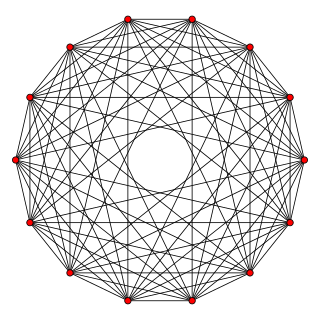Top Qs
Timeline
Chat
Perspective
7-orthoplex
Regular 7- polytope From Wikipedia, the free encyclopedia
Remove ads
In geometry, a 7-orthoplex, or 7-cross polytope, is a regular 7-polytope with 14 vertices, 84 edges, 280 triangle faces, 560 tetrahedron cells, 672 5-cell 4-faces, 448 5-faces, and 128 6-faces.
It has two constructed forms, the first being regular with Schläfli symbol {35,4}, and the second with alternately labeled (checkerboarded) facets, with Schläfli symbol {3,3,3,3,31,1} or Coxeter symbol 411.
It is a part of an infinite family of polytopes, called cross-polytopes or orthoplexes. The dual polytope is the 7-hypercube, or hepteract.
Remove ads
Alternate names
- Heptacross, derived from combining the family name cross polytope with hept for seven (dimensions) in Greek.
- Hecatonicosaoctaexon as a 128-facetted 7-polytope (polyexon). Acronym: zee[1]
As a configuration
Summarize
Perspective
This configuration matrix represents the 7-orthoplex. The rows and columns correspond to vertices, edges, faces, cells, 4-faces, 5-faces and 6-faces. The diagonal numbers say how many of each element occur in the whole 7-orthoplex. The nondiagonal numbers say how many of the column's element occur in or at the row's element.[2][3]
Remove ads
Images
Construction
There are two Coxeter groups associated with the 7-orthoplex, one regular, dual of the hepteract with the C7 or [4,3,3,3,3,3] symmetry group, and a half symmetry with two copies of 6-simplex facets, alternating, with the D7 or [34,1,1] symmetry group. A lowest symmetry construction is based on a dual of a 7-orthotope, called a 7-fusil.
Remove ads
Cartesian coordinates
Cartesian coordinates for the vertices of a 7-orthoplex, centered at the origin are
- (±1,0,0,0,0,0,0), (0,±1,0,0,0,0,0), (0,0,±1,0,0,0,0), (0,0,0,±1,0,0,0), (0,0,0,0,±1,0,0), (0,0,0,0,0,±1,0), (0,0,0,0,0,0,±1)
Every vertex pair is connected by an edge, except opposites.
See also
References
External links
Wikiwand - on
Seamless Wikipedia browsing. On steroids.
Remove ads









